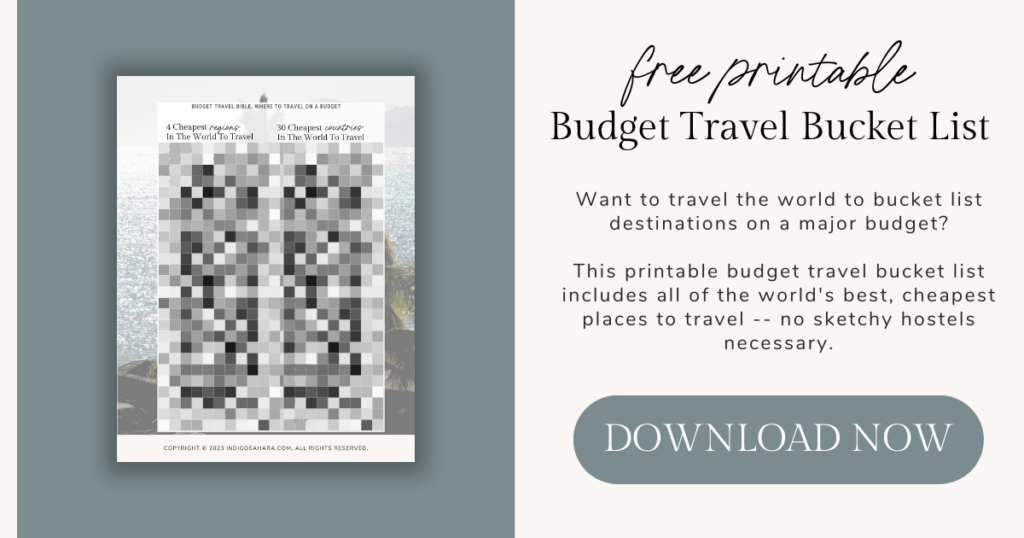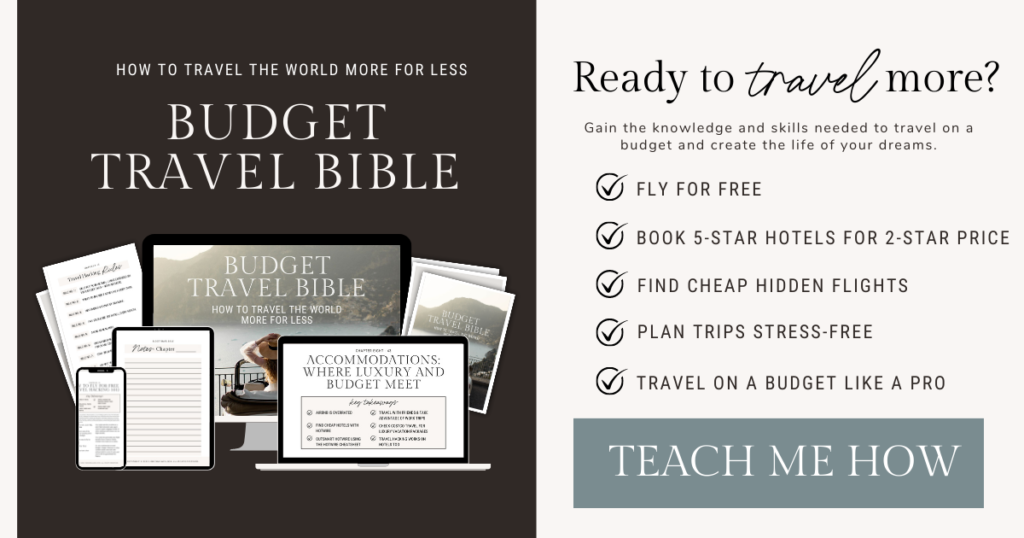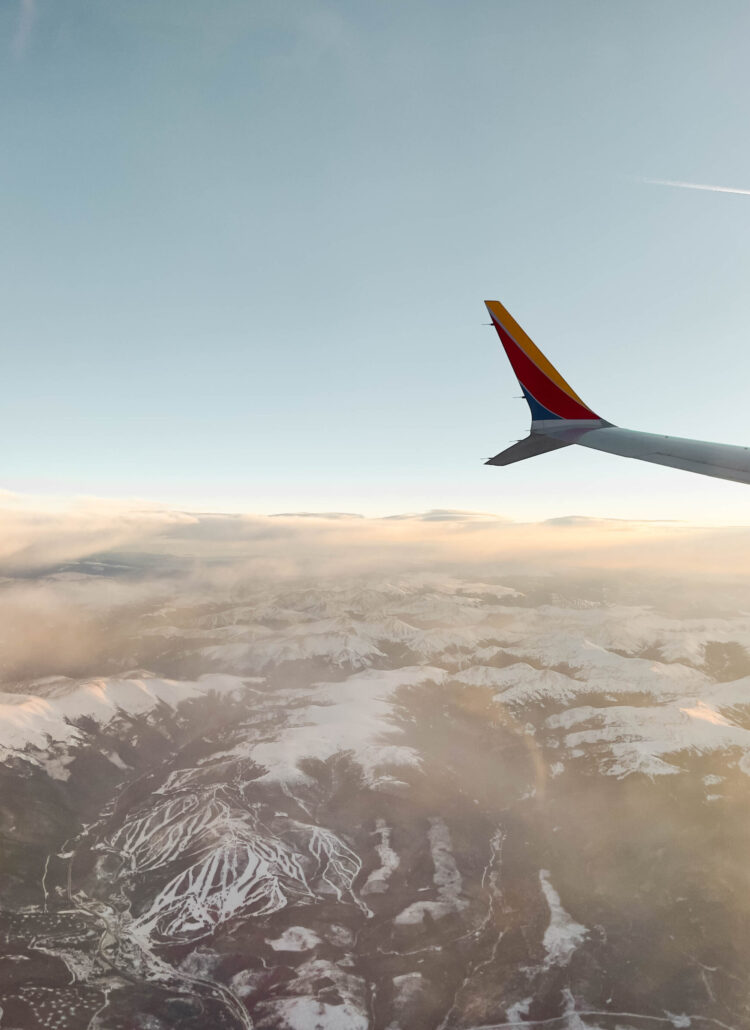Learning how to start traveling can seem overwhelming at first. From budgeting to learning how to book trips to knowing where to travel, there’s no wondering why some people never make the push to actually start traveling.
However, with these beginner travel tips, you will know exactly how to start traveling in less than five minutes.

Here’s how to start traveling in 7 easy steps.
1. Make the conscious decision to begin traveling.
To begin your new life as a traveler, there is one truth you need to understand.
You have complete control over your life.
You have both the ability and responsibility to live the life of your dreams. If the life of your dreams consists of traveling on a more regular basis, then you get to make the conscious decision to start traveling.

This fact may sound intimidating at first, but it is actually completely liberating. Once you understand that the world is yours to take, you have the freedom and confidence to take it.
Now that we got the pep talk taken care of, let’s get into the nitty-gritty of traveling.
2. Know where to travel as a beginner.
First, it’s important to know where to travel as a beginner.
Although you can literally travel anywhere in the world you wish (remember, it’s your conscious choice), some places are better to start with as a beginner traveler than others — especially if you have any anxiety when it comes to travel.
Where should a beginner travel?
A beginner should travel to a place that has the same language and a similar culture to his or her home country. This will help curb language barriers and culture shock, and make the beginner traveler’s experience a lot less overwhelming.
For example, if you are from the United States, you may consider traveling to Canada, the UK, Ireland, Australia or even another US state.


Likewise, if you are from Mexico, you may consider traveling to Costa Rica, Peru or even Spain.
Of course, if you have a strong desire to travel somewhere else, you should definitely consider following this desire, as experiencing new cultures and gaining cultural competence provides a whole range of personal growth benefits.
3. Start budgeting for travel.
Next, after you have an idea of where you want to travel, you’ll have an idea of how much money you’ll need to budget to execute the trip.
In general, the concept of budgeting for travel remains the same regardless of destination.
Here are some basic tips to start budgeting for travel.
How much money do you need to start traveling?
You actually don’t need a ton of money to start traveling. Even a couple hundred dollars can get you an amazing trip if you know how to budget properly and where to find the best travel deals.

Some people assume you have to be rich to travel, but this just isn’t true. You do not need to be rich to travel.
How do I start traveling with no money?
If you have no money, there are still ways to start traveling:
- Traveling for free with credit card points (travel hacking).
New to travel hacking and credit card points? I have a FREE download for you that will help! This travel hacking rules checklist will help you earn free flights and a higher credit score simultaneously.
- Using discount third-party booking sites, such as Hotwire.
- Taking advantage of work-related business trips.
- Working for an airline or hotel chain.
- Staying with out-of-state friends and family.
- Going on fundraised service projects or missions trips.
- Traveling to cheap places.
- Backpacking.
- Staying in hostels and couch surfing.
For more tips, visit my guide to traveling when you’re broke.
How much should I save for traveling?
5-10%.
If you want to start budgeting monthly for travel, which I highly recommend, you should aim to save at least 5-10% of your monthly income for travel.
Obviously, the more you save each month, the faster and more frequently you will be able to travel.

However, if you cannot swing that percentage, don’t worry. Any designated savings will add up to a vacation quickly. Saving even as little as 1% per month is better than saving nothing.
To learn how I budget for travel in 9 easy steps, click here.
4. Understand your job’s time-off rules.
Different employers have different rules and expectations for requested time off.
Some employers offer PTO (paid time off). Some employers have paycheck-deducted vacation funds. And, some employers don’t offer any benefits for time off.
Similarly, some employers expect you to request time off early in advance. Whereas, some employers don’t mind last-minute trips quite as much.

It’s important to understand your own employers rules and expectations as a traveler because if you do not adhere to the rules, you may limit yourself time off — or worse, employment — in the future.
On the other hand, if you follow the guidelines and show that you are a reliable, trustworthy employee that is essential to the company, your employer will be more willing to approve requested time off.


On that note, don’t be afraid to ask for time off work.
If you are reliable employee on a daily basis, it is likely that the worst reaction you’ll get to requesting time off is an eye roll or sarcastic remark about how your generation “doesn’t value work.”
Don’t take these responses personally. The negative employer responses to requested time off come from a place of jealousy and will brush over in a day. Your life experiences are more valuable than a snarky employer’s projected temporary opinion of you.
5. Know what’s important in a trip.
There are five key factors to remember when planning any trip:
- How you’ll get to your destination (flying, driving or train, etc.).
- Where you’ll stay (hotel, Airbnb or with family, etc.).
- What you’ll do while you’re there (best attractions, national parks, shopping, etc.).
- How you’ll get around when you’re there (public transportation or car rental, etc.).
- What you’ll eat (going to restaurants or buying groceries, etc.)
These key factors make up the meat of every single trip. If you know how to answer all of these questions before you leave, your trip will be a lot more enjoyable and less stressful.

Other factors that you might consider, depending on your own personal preferences, are how much you want to budget for souvenirs, how much you want to budget for miscellaneous or emergency expenses, and whether you’ll buy travel insurance.
If you don’t know where to start when it comes to budgeting for souvenirs, check out my FREE download – How To Save On Souvenirs. Not only will you come home with so many memories, you also won’t feel loads of regret buying souvenirs because you will know how to do so wisely.
6. Start traveling!
Finally, when it comes down to it, just start traveling. Pick your destination and book your trip.
If you need permission to book the trip, here it is. It doesn’t matter whether you travel across the globe or to a neighboring city. If you get in the habit of becoming a traveler, you will continue to travel more.
So, just book the trip and start traveling.
Have any questions about how to start traveling? Drop them in the reply section below. Or, send me a direct message on Instagram. I’m happy to help!
More Helpful Tips On How To Start Traveling
Flying For The First Time Step-By-Step Checklist
Personal Item Packing List: Essentials For A Great Flight
How To Budget For Travel In 9 Easy Steps
20 Bible Verses For Travel Anxiety
Save These Travel Tips For Later
Save these tips on how to start traveling by sharing to socials!









Leave a Reply